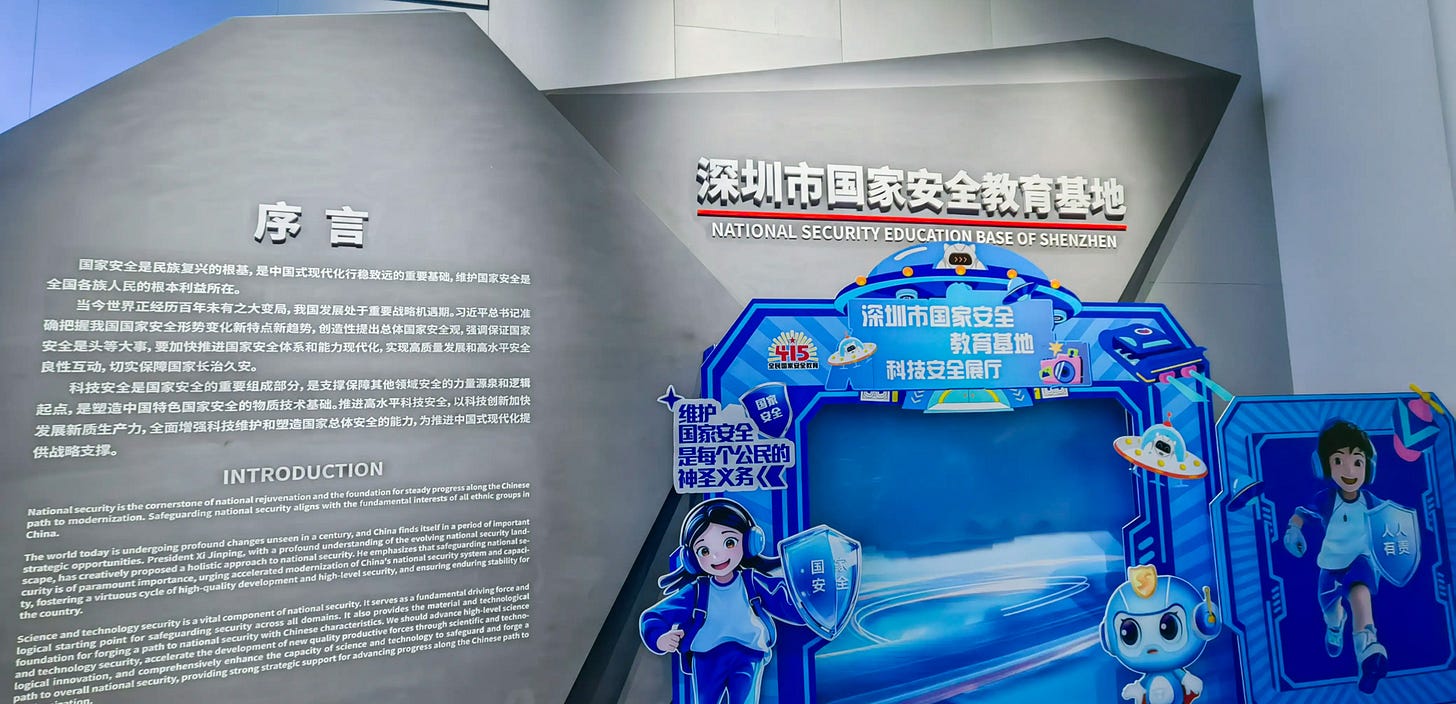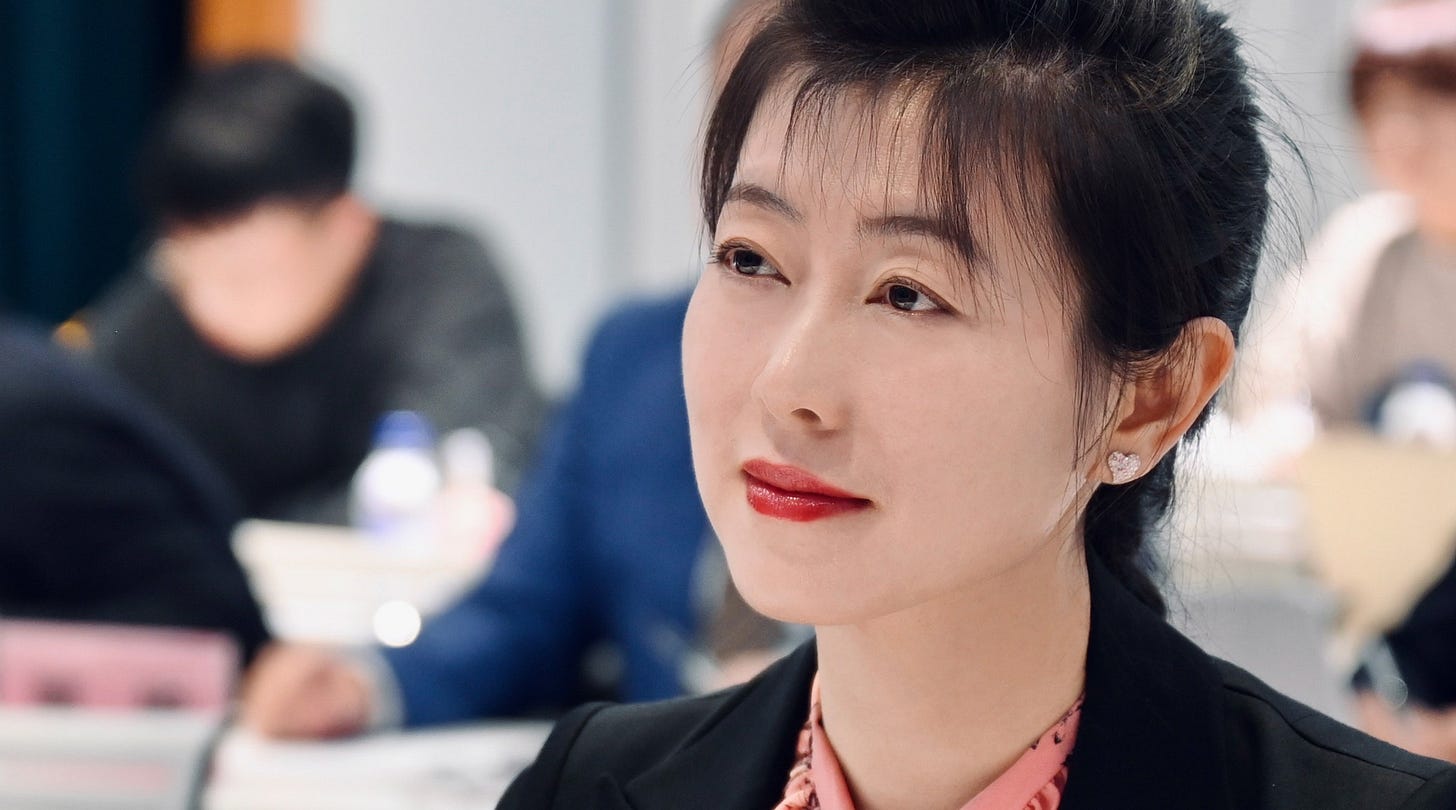security concerns permeate daily life, blurring the lines between state security and surveillance of society
A PRC White Paper issued 12 May, claims a unique approach to state security, 'consolidating security in development while seeking development in security'. States, like the PRC, should recognise the interlinked nature of these two elements, advises Chou Zejing 丑则静 University of International Relations, touting Beijing’s GSI (Global Security Initiative) in pursuit of global collaboration.
The rhetoric of ‘development-security’ integration is also a core mantra of domestic governance under Xi, firmly wielded for over a decade. Positioning the impending 15th 5-year plan in regional strategy terms, development must be balanced with security, Xi Jinping told local Party and State leaders. ‘Virtuous interaction’ is imperative between high-quality development and high-level security.
Further detail is added by Tang Junfeng 汤俊峰 NDU (National Defence University). Development has been an unwavering CPC objective, but with external shocks, including US unilateralism, protectionism, and hegemonic behaviour, coinciding with domestic uncertainties, institutional collapse remains an ever-present threat.
Needed by all, security measures must work both ways: just as the state keeps the nation safe, what it builds and makes must help keep the Party-state safe too.
Private participation in security build-up in major sectors is to be backed by the NDRC (National Development and Reform Commission).
rounding up short boards
Scitech has long since occupied the development summit. Upholding baseline thinking, high-level officials and researchers see risk in the current tech boom. The global tech paradigm is shifting, warns Chen Yixin 陈一新 Minister of State Security. Rapidly maturing, AI is capable of restructuring assumptions about global power and social governance. The PRC must prepare, he adds, for trouble.
Steering public opinion is a rising application of AI, warns Xiao Xi 肖晞 Jilin University National Institute of Development Security. A function of discourse power, he argues, public opinion is an arena of ideological force. Used in propaganda, AI may polarise ideology.
Warding off the threat calls for reinforcing tech capability, guiding citizens to ‘correctly’ grasp social implications. Shift the burden to cyber platforms, urges Pi Yong 皮勇 Tongji University Shanghai International IP College, nudging platforms to curb ‘unlawful’ messages and AI-boosted cyber fraud.
Despite inherent risks, AI itself provides the state oversight teeth. Tighten coordination between the CSTC (Central Science and Technology Commission) and CNSC (Central National Security Commission), advises Fu Xiaoqiang 傅小强 China Institutes of Contemporary International Relations (‘CICIR’, the Ministry of State Security’s 11th Bureau). Combining resources would centralise control over industry, academia, finance and enterprise. With greater capacity, a big data platform can now be built, linking security domains to enable AI-powered 24/7 real-time monitoring.
taking security local
Merging development and security is ever more on local agendas. Reiterating an age-old Party mantra, Han Wenxiu 韩文秀 Central Financial and Economic Commission Office, insists on central policies adapting to local conditions, avoiding uniformity and failing to solve local issues. This underpins security work as well: general principles are replicated across regions, while specific measures vary.
Provincial leaders follow another mantra: ‘Party leadership in security work’. Liu Ning 刘宁 Henan Party Secretary, for instance, declares his Committee’s insistence on
Party leadership in state security work
mandated state security oversight of Party units
These cross-cutting controls are applied to local security by Yun Hong 尹弘 CPC Jiangxi Party Secretary. Based on Party regulations, Jiangxi developed a three-tier security work system, with its horizontal command chain cutting across provincial, municipal and county levels. Security assessment is part of cadre performance evaluation, placing them on notice to shore up political awareness.
Regional incentives to safeguard security vary from province to province. A lead province in scitech, Anhui places a premium on PRC tech self-sufficiency. With over 80 percent of its breakthrough sci-tech projects led by firms, the province stepped up support for private innovation, notes Liang Yanshun 梁言顺 Party Secretary. Progressing in quantum information tech, fusion energy and deep space exploration, it produced dozens of tech products and services, claimed to break ‘foreign monopolies’.
While also a hub for scitech development, the big grain-producing province of Hunan is also tasked with shoring up food security. Bolstering supply chains, it pioneers a ‘national grain reserve base’ program, rewarding farmers and localities to boost production. Some 30 bn kilograms of grain have been harvested over five consecutive years. Harping on bumper harvest claims is not unlike the Great Leap Forward.
futures and people
Popular support is deemed essential to the range of measures. Yet as a lasting impact of decades of peace, the population tends to lack security awareness, lament Xie Xinshui 谢新水 Beijing Overall State Security Outlook Research Centre and Wang Daguang 王大广 Capital Normal University. State security needs to live in the minds of primary and secondary school students nationwide. Schools need to make evaluations tailored to this need.
Education must indeed go beyond classrooms, advises You Zhibin 游志斌 Central Party School: clarify how it is to take place on different administrative levels, guiding cadres, students, tech experts, public officials, enterprise personnel and the general public to shore up the ‘social base’ so that all help defend the state.
MSS (the Ministry of State Security), generalising security to an extreme, recently warned citizens against breaching state security when using scanning apps. All individuals were ‘party to state defence measures’, it warned, linking personal information leaks with state-level risks.
securitisers
Chen Yixin 陈一新 | Minister of State Security
Major changes ‘unseen in a century’ are afoot, argues Chen, with global power in flux. Internal conflicts roil the developed world as newly emerging markets and developing states develop apace. Failing to ride the multipolarity wave, erstwhile hegemonic powers weaponised trade policy, illicitly tampering with trade protocols. Reverting to zero-sum games, tech paradigms undergo rapid global change. AI booms, restructuring power, social governance and civilisation. To withstand these shocks, the PRC must boost development while securing the political field, safeguarding its ideology and curbing extremism.
A Party member by 1982, Chen worked in Lishui and was promoted to the Party’s Zhejiang office a decade later. By 1995, he directed its Politics and Law Department. As a Deputy Secretary-General in 2006, he cemented ties with Xi Jinping. On the latter’s rise to leadership in 2012, Chen chaired the powerful Central Political and Legal Affairs Commission. He was appointed Minister of State for Security in 2022.
Xiao Xi 肖晞 | Jilin University School of Public Diplomacy and National Institute of Development Security president
Defining a new industrial revolution, argues Xiao, AI’s speed, versatility, IQ, and cross-sector adaptability profoundly impact state security. From strategy to tactics, it reshapes defence: reducing combat costs, enabling unmanned precision, gathering intel, and blurring lines between info, cognitive, and physical warfare. Yet its rise reorders power-state actors, rivalled ever more by transnational tech firms, forming cyber clusters operating beyond state control and pose new risks. AI-created content may distort public opinion, inflame ideological divides, and challenge state discursive power. Intensifying tensions between productivity and regulation it raises ethical concerns in research, media, and law. The state must hence boost its tech and governance capacity, spread AI literacy, within a global governance framework.
An inaugural member of the State Council Academic Degrees Committee State Security Discipline Review Group, Xiao is a diplomacy and state security pundit. Vocal on strategic positioning, her work resonates, with over 40 reports endorsed by Beijing state agencies and the Jilin Party.






